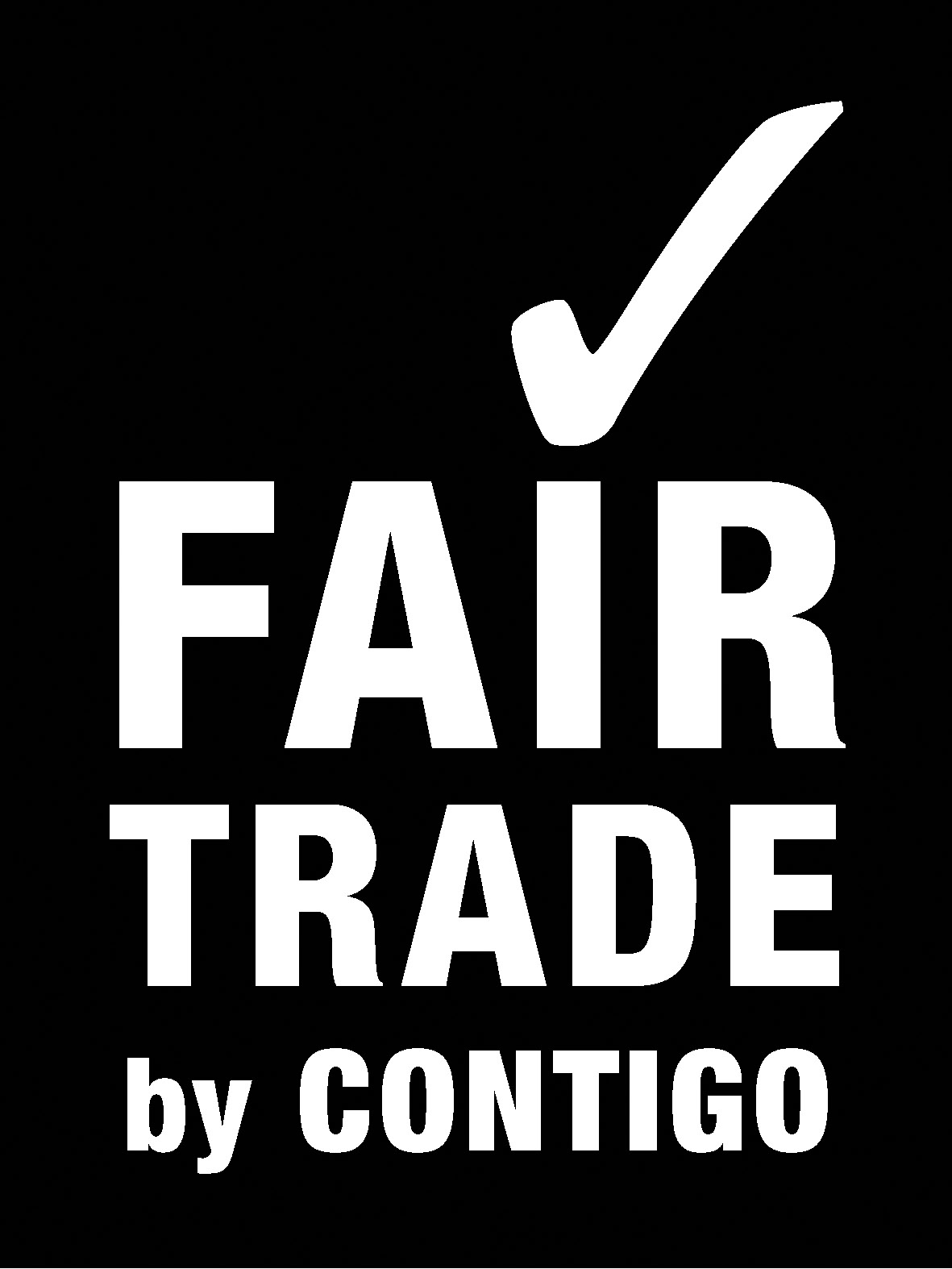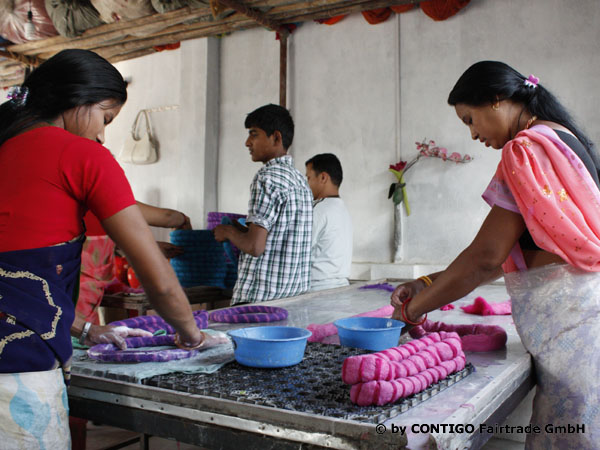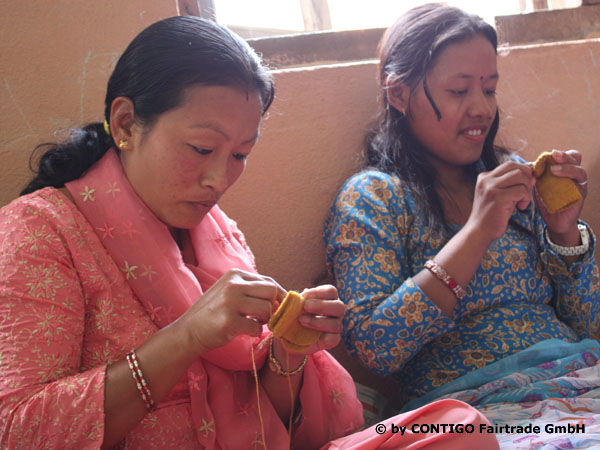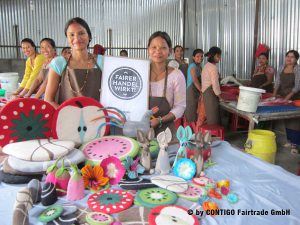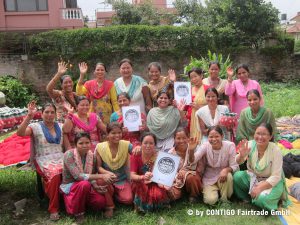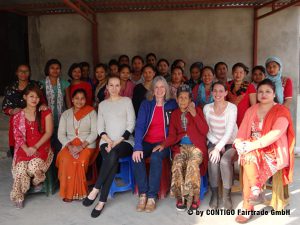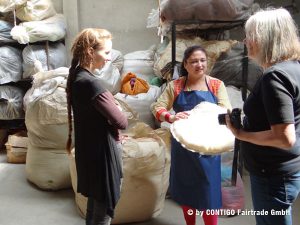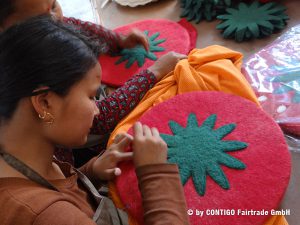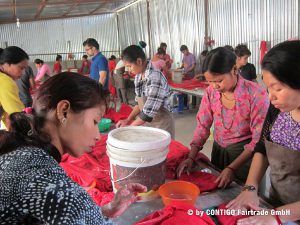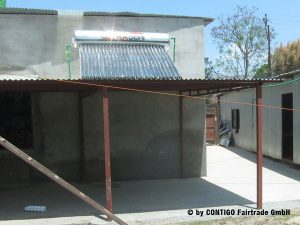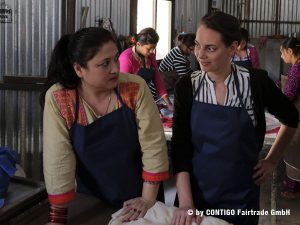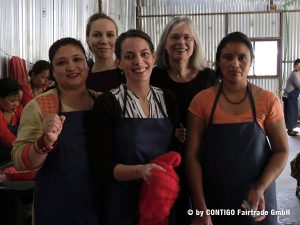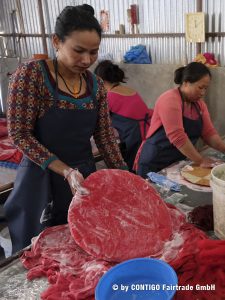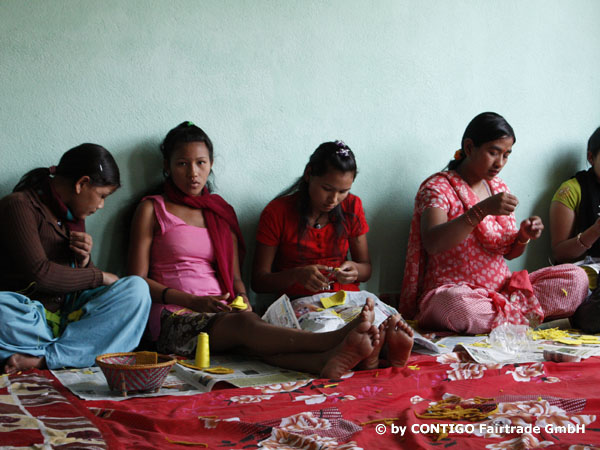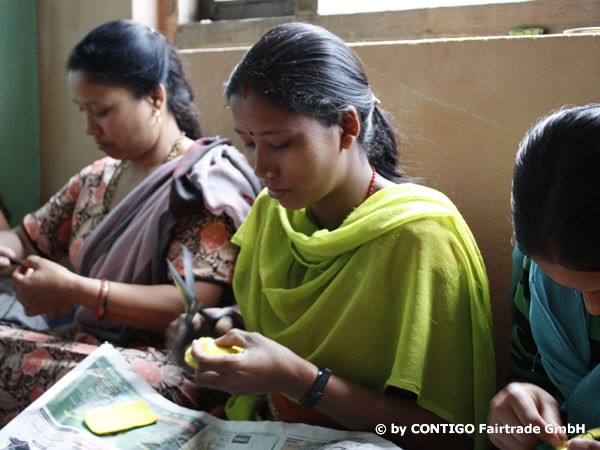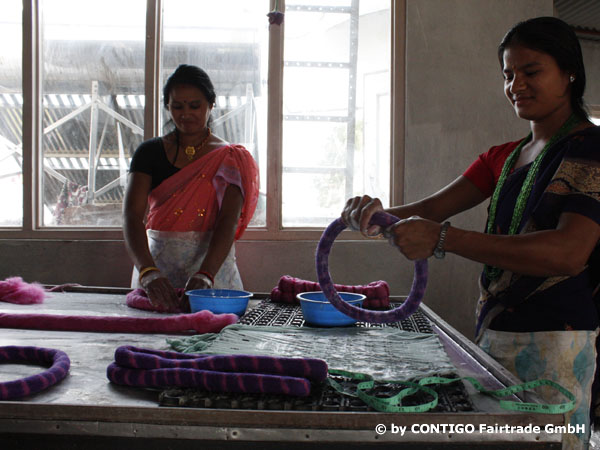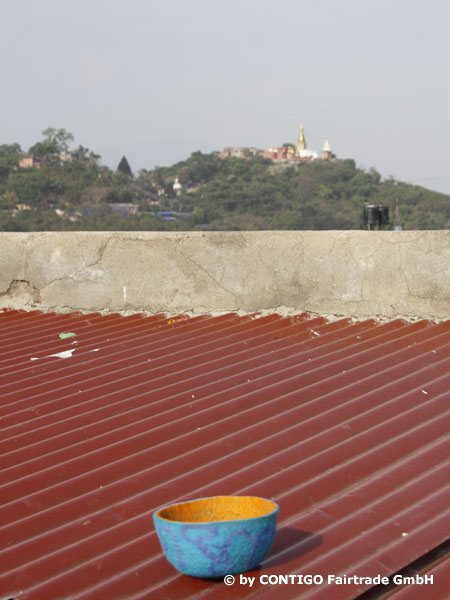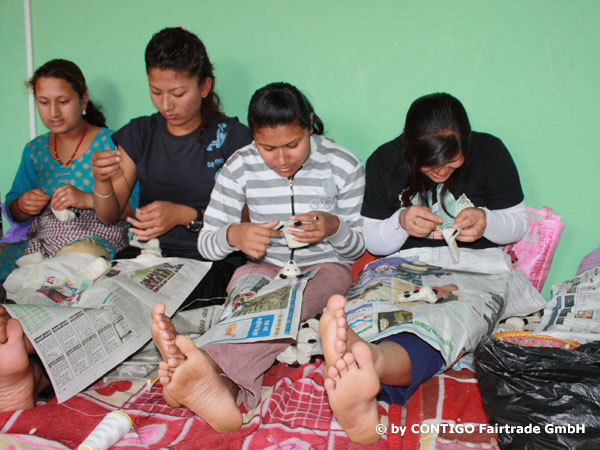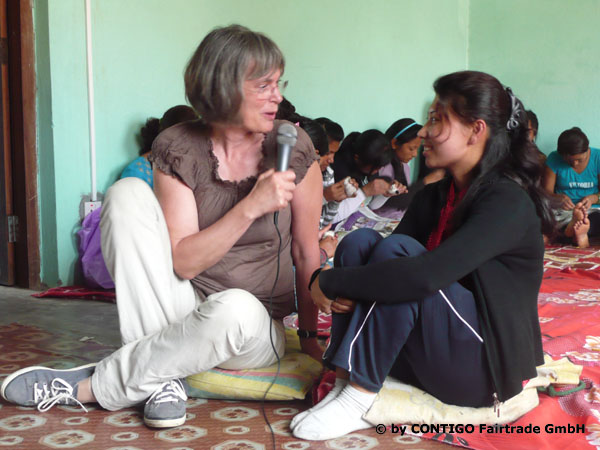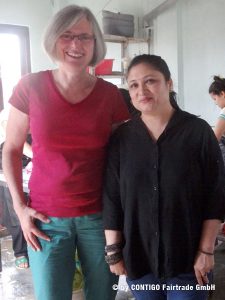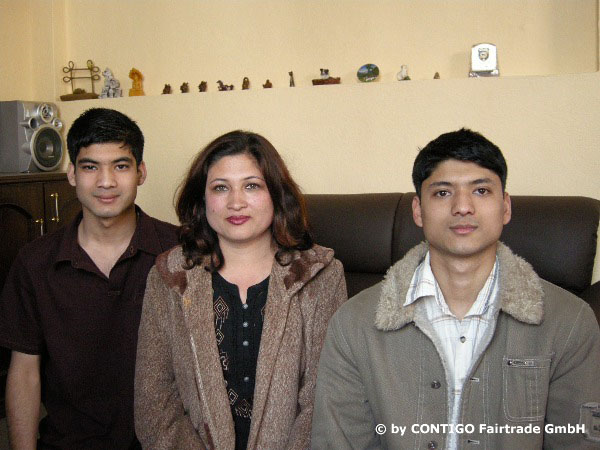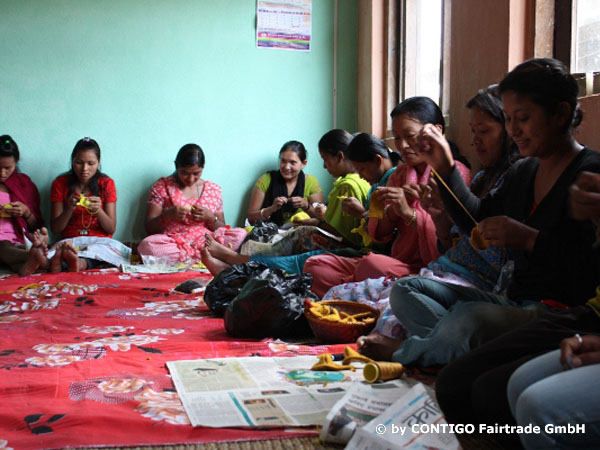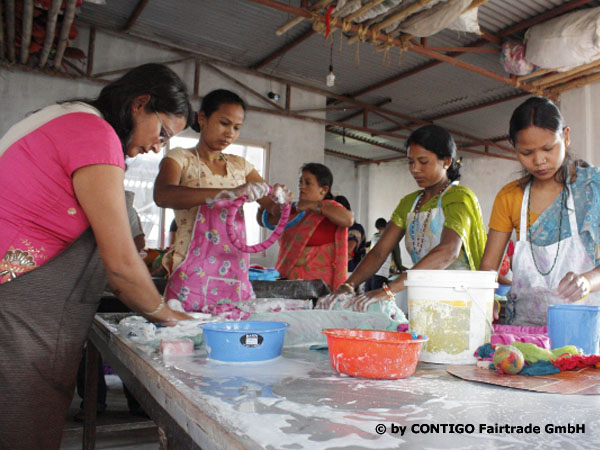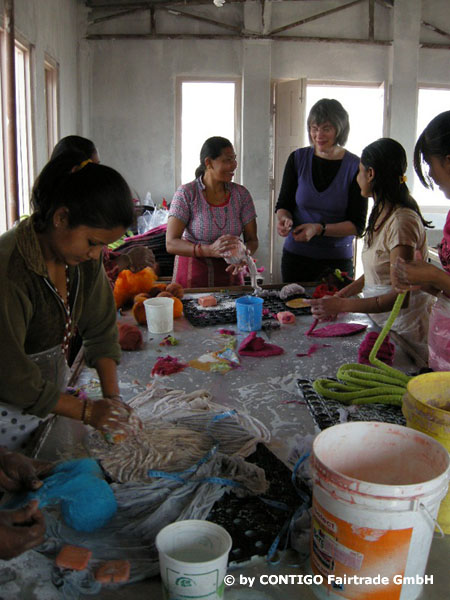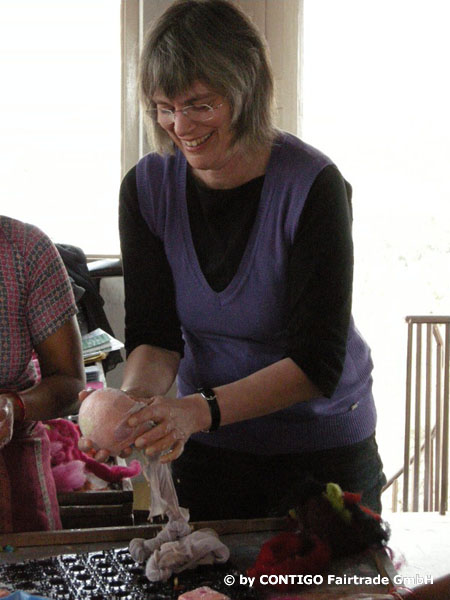Contents
[ hide ]
- 1 Profile of CONTIGO´s partner Shirbandi
- 1.1 Supply chain
- 1.2 Products
- 1.3 Location
- 1.4 Founded in 1997
- 1.5 History
- 1.6 Cooperation with CONTIGO since 2005
- 1.7 Structure of the business
- 1.8 Sales
- 1.9 Goals
- 1.10 Special features
- 2 Fairtrade classification
- 3 Fairtrade aspects
- 3.1 No child labour
- 3.2 No discrimination
- 3.3 Fair wages
- 3.4 Humane working conditions
- 3.5 Transparency
- 4 Monitoring
- 5 Country information
- 6 Photos
Profile of CONTIGO´s partner Shirbandi
Supply chain
Trading Partner: Shirbandi, microenterprise
Function: Producer
Structure: Own production plant, affiliated production groups
Tradeway: Direct import CONTIGO
Products
Hand-felted products
Location
Kathmandu, Nepal – distance to Europe: 6,700km
Founded in 1997
History
- 1997: Founding of a silver and gold working workshop by Mr Shresta
- Since 2002: Financial support of felters as neighbourly help, not a professional business
- 2004: Mrs Sangita Shresta visits relatives in Germany, first contact to CONTIGO. Her request: establishment of a professional business for felt arts, searching for distributors for her products
- 2005: Founding of felt workshop in Sangita Shrestas house in Sitapaila for wet felting, establishment of another felt workshop in Sunakothi for sewing. Her husband continues with silver and gold workshop
- 2005: Start of the cooperation with CONTIGO, intensive product development with regards to quality and design
- Since 2011: Shirbandi can win additional foreign customers in the U.S. and expands the product range to toys
- 2015: After the terrible earthquake in April, a workshop (at grade) for wet felting can be established on the neighbouring plot (which Shirbandi can rent for five years)
- 2016: Mrs Shrestas sons Ayush and Sanyam finsh their studies and support the business of their mother
- 2017: The CONTIGO e.V. (registered society) co-finances a solar heating system for water heater in the workshop in Sitapaila
- 2019: The statutory requirement to pay salaries into bank accounts is implemented at Shirbandi. Mrs. Shresta takes care of the opening of bank accounts for her employees.
Cooperation with CONTIGO since 2005
Structure of the business
Number of employees:
60 employees (in case of increased workload, additional employees are hired, mostly family members or of circle of friends with experiences in felting and sewing)
-
- 25 felters
- 25 sewers
- 5 employees for finishing and packing
- 5 employees for quality control
Female employees for wet felting work full-time, employees in the sewing workshop work part-time (by the hour) on piece-rated basis. Working hours depend on private liabili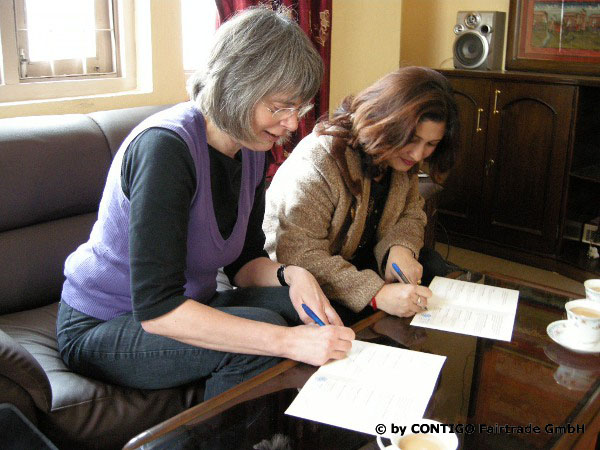 ties.
ties.
Work environment:
- 2 workshops:
- Felt workshop in Sitapaila, district of Kathmandu
- Sewing workshop in Sunakothi, small village, 4 km to the south of Lalitpur
Organisation of work (in the production):
1) Sitapaila:
- Headoffice and central workshop for wet felting
- Warehouse for raw materials
- Quality control
- Packaging
- Product developement
Since 2015: new production building (at grade) on the neighbouring plot, in addition to the workshop rooms in the upper floors of Mrs Shrestas house. Female employees live in the neighbouring districts and normally work full-time. The grandmothers take care of their children.
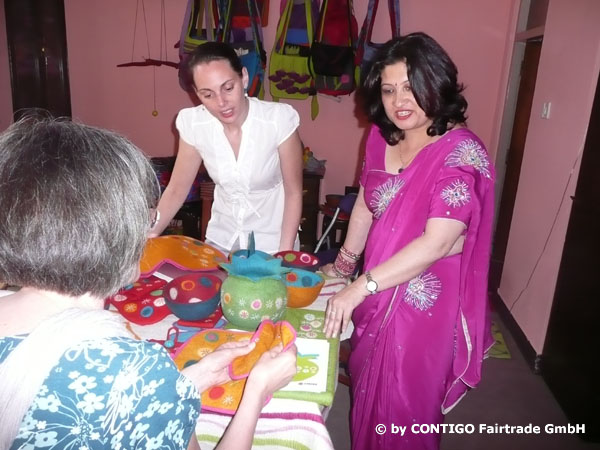
2) Sunakothi:
- Workshop room on the first floor of an appartment building
- Simple equipment for hand sewing and stitching
- Many young mothers and college students
- Most of them work part-time, depending on order situation and private liabilities
- Sapana is an experienced supervisor and is responsible for quality control and guidance
Sangita Shresta coordinates the work both workshops and visits them daily. She delivers raw materials, raw products and picks up finished orders.
Sales
- Exports (100%) to Germany and U.S.A.
Goals
- To introduce a life insurance for all employees
- To introduce a health insurance and better health care for employees
- To enter new markets
- To increase the amount of employees
- To start another business where Shirbandi can provide work for those who are unable to continue felting
Special features
- Part-time jobs are given to college students to support them during their education
Why does CONTIGO work with Shirbandi: Mrs. Shrestha is a dedicated women. She understands new ideas quickly and can make them become reality. She is very committed to giving workers the best possible training.
Personal impression by Monika Herbst: “During our visits we could feel that there is a very familiar and happy atmosphere in both workshops. All women are laughing, joking and work as a good team. When days are stressy the women sing and dance in between, manager Sangita Shresta told us. We have always experienced a very warm and special hospitality, we can learn from.”
Fairtrade classification
FTA = Fairtrade Approved
Fairtrade aspects
Shirbandi complies with the following Fairtrade Principles: 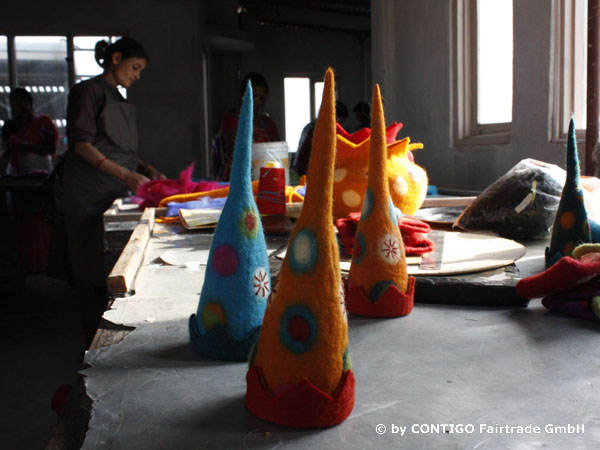
No child labour
No discrimination
No discrimination due to gender, disability, religion, ethnicity, sexual orientation, political orientation, or infection with HIV
Fair wages
- Official minimum wage in industrial sector: NPR 15,000/month (NPR=Nepalese Rupees), since 2021
- Wages at Shirbandi:
- Felters in Sitapaila work on a piece-rated basis. The piece rate is agreed together and depends on expenditure of time and level of difficulty of the product. The piece rate is adapted every two years. Depending on order situation, one felter can earn up to 17.000/month
-
- Fixed salaries for 5 employees (in supervision, quality control, teaching new employees, finishing and packaging), between NPR 14,000 -18,000/month, all work full-time
- Sewers in Sunakothi work on a piece-rated basis, mainly part-time. NPR 4.000-5.000/month, as an additional income
- Part-time employees for finishing and packaging receive an agreed daily wage
- Wages are transferred to bank accounts at the end of the month (festival bonus is paid out during the month)
- Employees with fixed salaries (in Sitapaila) receive
- bonus for overtime
- yearly bonus depending on performance
- All employees (fixed salary and piece-rate) receive bonuses for different festivals: Dashain (NPR 2,000), Diwali (NPR 1,000), Maghe (NPR 500) and Teej (NPR 500)
Humane working conditions
Working hours in Sitapaila:
- 8 hours/day: start of work from 7:30 a.m., end of work not later than 6 p.m.
- Regular breaks: lunch break at 1 p.m., tea break (tiffin) at 4 p.m., tea and snacks are provided by Shirbandi
- 6 days/week
Social benefits:
All employees with fixed salaries receive:
- In case of little work, employees receive a basis income of NPR 7,000/month, will be deducted later
- In case of need medical expenses or medicine are paid
- Financial support of employees in case of compassionate grounds
- Continued payment of wage in case of sickness or accident
- Twice a year Shirbandi arranges picnics and travels for their staff
Educational opportunities:
- Training of employees in new techniques
- Thorough initial training for all new employees by Shirbandi’s felters and sewers
Transparency
- Payroll is available
- SAR (Self Assessment Report) was duly submitted to CONTIGO
Monitoring
- Personal visits in Kathmandu (2009, 2011, 2015, 2018)
Country information
See Encyclopaedia Britannica: Nepal
Photos
Visiting Shirbandi in Kathmandu, and the workshops in Sitapaila & Sunakothi (2018):
Visiting Shirbandi in Kathmandu (2011 & 2015):
